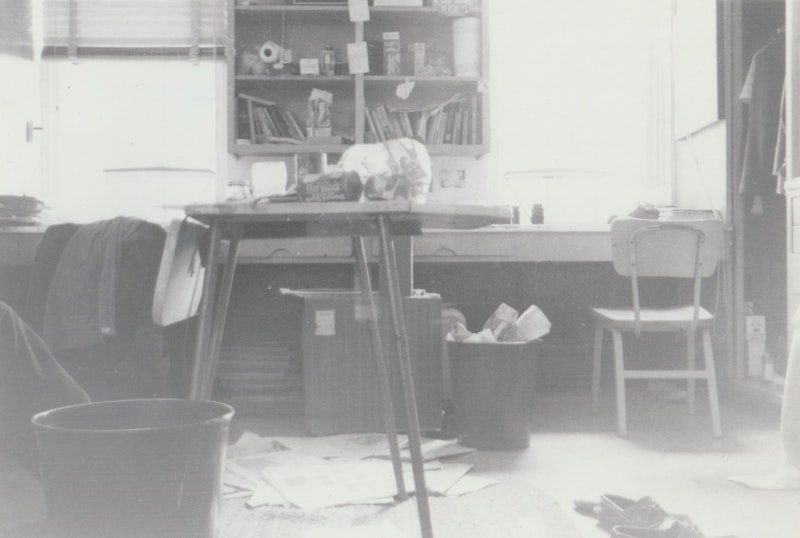College life, and strife, isn’t of particular interest to me, since my sons are 30 and 29, and increasingly larcenous tuition bills no longer appear in the small stack of mail that’s dumped in our vestibule every evening, excluding Sunday, between seven and nine—that is, if USPS has enough employees to make their rounds. Nevertheless, I read what’s now considered a lengthy story in The Los Angeles Times last week about a student housing controversy at UCLA. A planned residence hall with “micro rooms” at the low (for the Westwood neighborhood) price of $600/per month was put on hold when the University of California Regents raised questions about how the small units might have an impact on “student mental health.” Regent Hadi Makarechian said, “I don’t want to call these jails… but these aren’t really good dorms.” A recent survey, according to the Times article, showed that students weren’t dissatisfied with 250 square feet rooms.
I’m not especially well-versed—aside from what I read—on the problems college students, and their parents, face today, from crippling financial burden to ad hoc violence, and, perhaps most significantly, a curriculum (even at a top-notch school like UCLA) that’s dictated by current liberal nostrums and wouldn’t be recognizable even 20 years ago. Still, my guess is that most of the young men and women who choose a collegiate experience are resilient and that “mental health issues,” while real, as they’ve always been, are exaggerated.
Fifty years ago this month I entered the freshman class at Johns Hopkins University—the student body was then 2000 and has quadrupled in size since, as JHU buys up more and more Baltimore real estate (upping the tax burden for city residents)—and arrived at my room at 103 Griffin House with a trunk and a smile on my face, thrilled to join what was a first step to the “real world.” It was long before social media, and the University paired roommates as best they could by surveys mailed to your home, and I’ve no idea whether that mattered all that much. My roommate, from Texas, and I were lumped together because we were both English majors (four out of 500 freshman) and smokers. I was lucky: Mark was a smart, friendly guy who shared similar musical and literature tastes, had long hair, brought a record player and his guitar, and we quickly (as people of that age do) became close friends.
I bring this up because, as you can see from the picture of our room taken that fall, space was tight; I’d ballpark it at 160 square feet. (At that time, JHU provided on-campus living only for first-year students; after that, it was up to you to find housing in Baltimore, which was very cheap and far preferable.) We were on the first floor: the communal bathrooms and showers on the second floor, and there was no air conditioning or hot plate set-up. The beds were bare-bones, bolted to the wall; the counter that functioned as desks had students right next to each other; and we each had an open closet for clothes.
We never locked the windows, since it was easy to get in from outside if keys were forgotten, and as you can see from the messy floor, the weekly “maid service” wasn’t all that effectual. There was a laundry room in the basement, and next to Griffin was a snack bar and mail room. The chairs were spartan hard-backs and I took many a tumble when leaning back while reading. But I was 18—like those students today at UCLA—and falling on my ass was no big deal. (Today, it goes without saying, such a mishap can have repercussions. Several years ago, my foot fell asleep while watching a ballgame; I got up, fell, and the next morning was fitted for a six-week boot.) There was a phone at the end of the hall, and the two guys next to it had the unfortunate task of answering it (when in the mood); so I’d get a knock on the door from Irwin, saying, “Hey Smith, you’ve got a call… it’s a chick!” This wasn’t that frequent, I’ll admit, and sometimes that “chick” was named Mom, ringing for our monthly catch-up.
My roommate wasn’t in frequent touch with his parents either—he got along fine with them—and I wonder if the constant texting between students and parents (not so long ago called “helicopter parents,” and I’ve no idea what the current slang is) contributes to “mental health issues” that are in the headlines. The heavy use of social media (and a list of available drugs that I can’t even pronounce) must be a distraction at best, a source for cyber-bullying at worst. Again, I’m not denying the unease and depression of some teens today—it wasn’t talked about much in my day, but at JHU there was a counseling center near the dorms which was helpful to some friends—often the anxiety decreased when they decided to drop parental “pre-med” orders and majored in what they were really interested in—but I doubt the size of dormitory rooms is biggest hurdle to overcome.
—Follow Russ Smith on Twitter: @MUGGER2023

